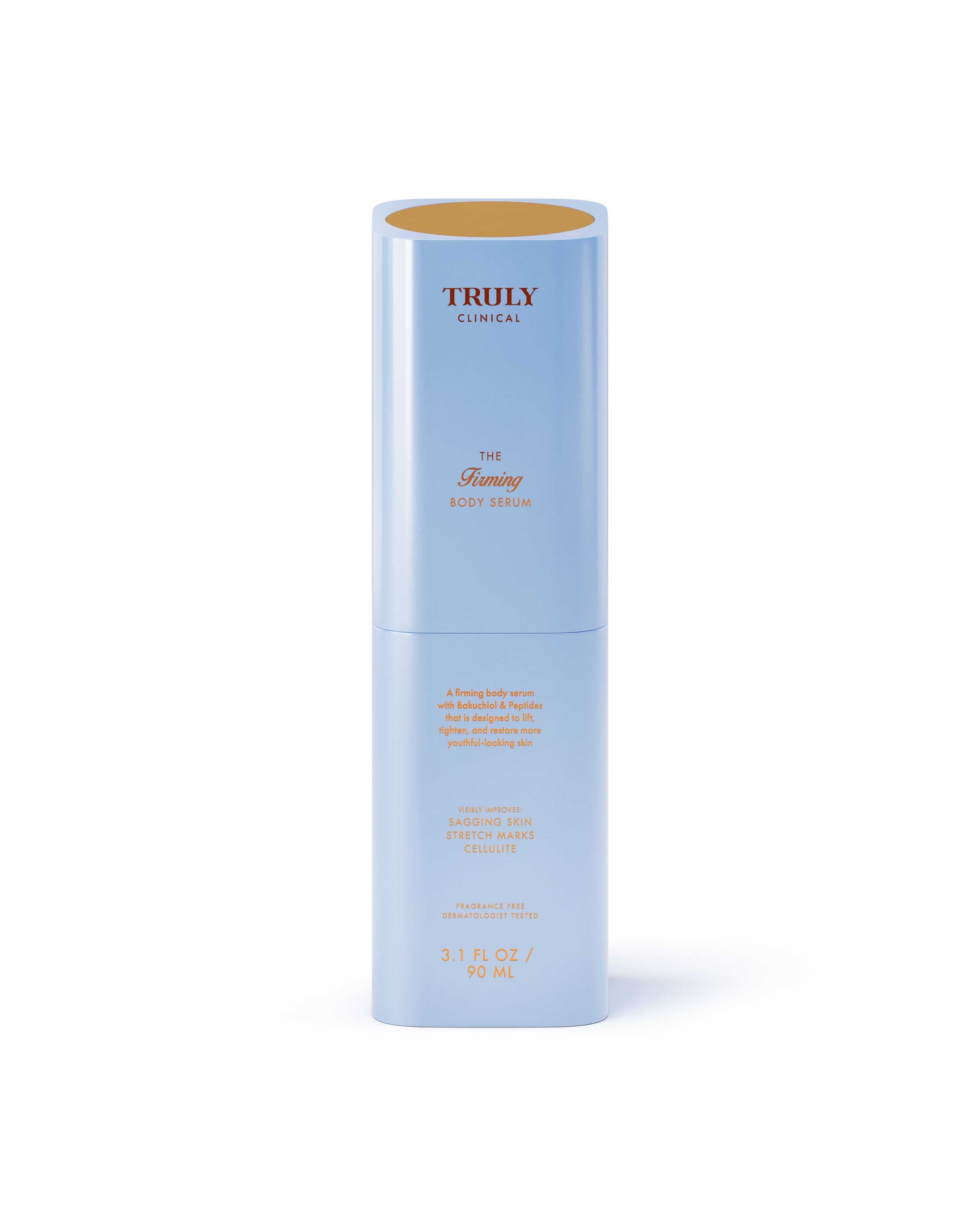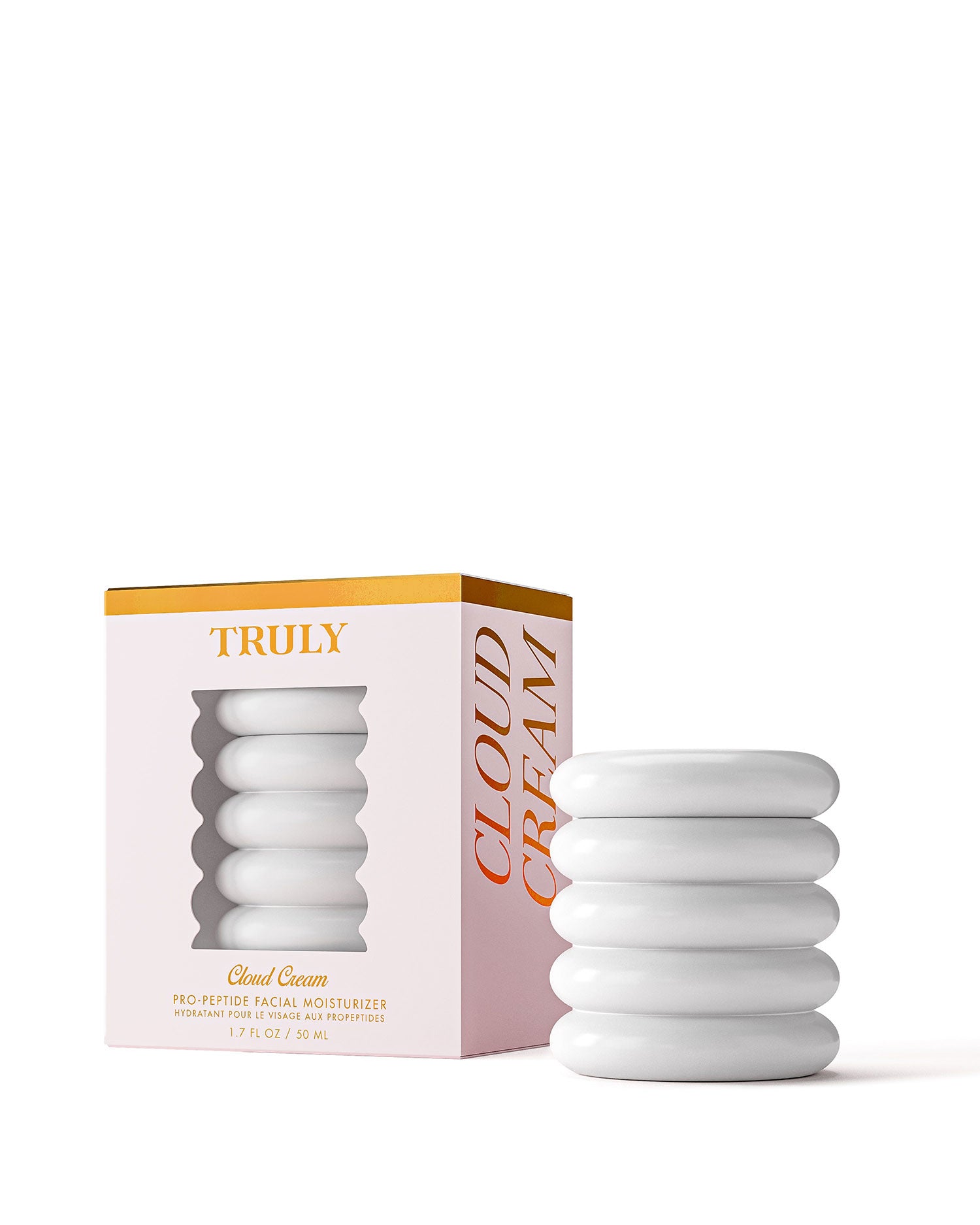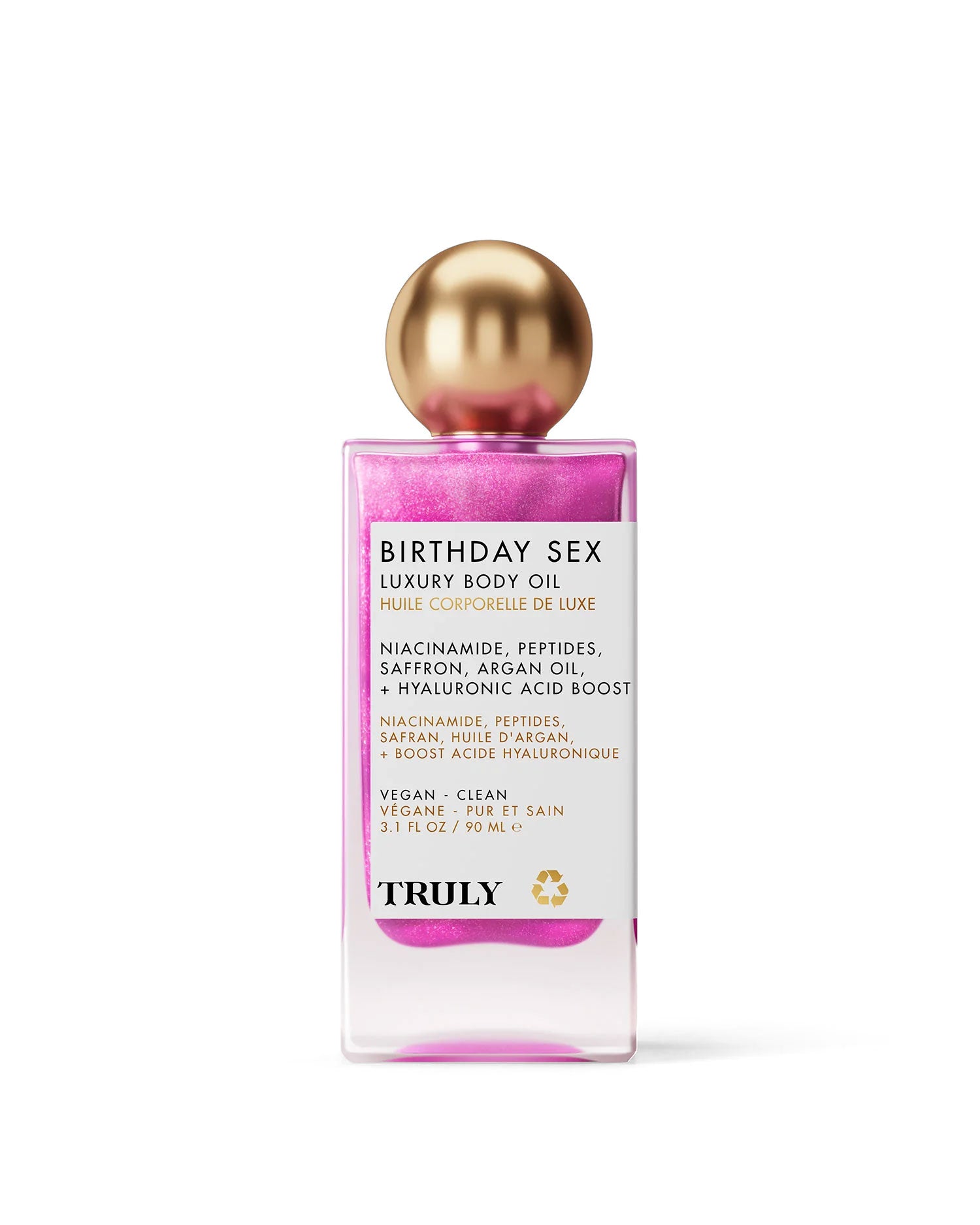What are the Best Peptides for Skin?
November 12, 2025
By: Lauren Sindel
The best peptides for skin include Acetyl Hexapeptide-8 and Palmitoyl Pentapeptide-4 which can be found in Truly Beauty's dermatologist-tested serums.
Peptides are sort of like a personal trainer for your skin. Instead of forcing instant results, they guide your skin to rebuild collagen, smooth fine lines, and increase elasticity over time.
Acetyl Hexapeptide-8 reduces expression lines like targeted workouts, while Palmitoyl Pentapeptide-4 firms and plumps, helping your skin look naturally lifted.
What is the Best Peptide Serum?
The best peptide serum is Truly's The Firming Body Serum, a dermatologist-tested serum that firms the skin and reduces wrinkles with acetyl hexapeptide-8, bakuchiol, and Tru-Barrier Complex™.
- Key ingredients: Peptides (acetyl hexapeptide-8), bakuchiol, Tru-Barrier Complex™
- Best for: All skin types
- Targets: Fine lines, stretch marks, cellulite, sagging skin
- Fragrance-free: Yes
What science says: Clinical studies show that acetyl hexapeptide-8, alone or in multi-ingredient formulations, helps reduce wrinkles and scar appearance. Across 10 studies, all reported improvements with no significant adverse effects.
Why Trust Truly Beauty?
Founded in 2013, Truly Beauty combines the expertise of dermatologists and skincare professionals with clean, high performance ingredients to deliver visible, reliable results with a serious serving of luxury. Trusted by a global community of skincare enthusiasts, every product is vegan, cruelty-free, and expertly crafted to support healthy, radiant skin.
What are Peptides?
Peptides are strings of amino acids that occur naturally in your skin. They act as the building blocks of collagen, elastin, and keratin—essential proteins that keep skin firm, smooth, and youthful.
Peptides work by penetrating the outer layer of skin, signaling cells to boost collagen production, enhance elasticity, and accelerate repair. This makes them a powerhouse ingredient for reducing fine lines, improving hydration, calming inflammation, and promoting a brighter, healthier complexion.
What are the Best Peptides for Skin?
Here are the different types of peptides for skin that can work wonders on fine lines, wrinkles, stretch marks, and sagging skin.
1. Acetyl Hexapeptide-8 (Argireline)
Nicknamed “Botox in a bottle,” this peptide helps relax facial muscles to visibly reduce expression lines. It’s especially effective around the eyes and forehead, where wrinkles tend to form first. The result? Softer, smoother skin — no needles required.
2. Palmitoyl Pentapeptide-4 (Matrixyl)
A true anti-aging classic. Palmitoyl Pentapeptide-4, or Matrixyl Peptide, works by stimulating collagen and elastin production to help firm and plump the skin. Over time, it minimizes fine lines and restores that youthful bounce and resilience we all crave.
3. Copper Peptides
Known for their signature blue hue, copper peptides help strengthen the skin barrier, speed up repair, and fight free radicals. They also promote collagen and elastin — making them a favorite for improving overall tone, texture, and glow.
4. Palmitoyl Tetrapeptide-7
This peptide focuses on calming and restoring the skin. It helps reduce inflammation and supports skin renewal, which can minimize redness and puffiness while boosting elasticity. It often pairs beautifully with Matrixyl for an even more powerful anti-aging effect.
5. Acetyl Tetrapeptide-11
Acetyl tetrapeptide-11 is a signal peptide made up of amino acids leucine, proline and tyrosine that stimulates the growth of keratinocytes. It is designed to address signs of aging by strengthening the connection between the dermis and outer layer of of skin by stimulating collagen and elastin while accelerating skin regeneration. It has also been proven to thicken thin skin, plumping out fine lines and wrinkles.
6. Acetyl Tetrapeptide-9
Acetyl Tetrapeptide-9 is a synthetic peptide composed of four amino acids: aspartic acid, glutamine, histidine, and valine. This molecule helps to strengthen the epidermis, restore skin’s natural support, and keep skin smooth and supple. It’s commonly found in creams and serums designed to firm the skin and improve the appearance of fine lines.
Acetyl tetrapeptide-9 has also been shown to reduce inflammation and fight against bacteria such as Staphylococcus aureus which can help soothe irritated, sensitive skin and potentially combat acne.
7. Acetyl Tetrapeptide-2
Acetyl Tetrapeptide-2 is a four amino acid peptide that mimics the youth hormone known as thymopoietin to fight against signs of aging. According to studies, it is able to stimulate elastin production, the protein responsible for maintaining skin’s firmness. By stimulating elastin production, this synthetic peptide can keep skin looking firm, smooth, and youthful.
Alongside its anti-aging properties, Acetyl Tetrapeptide-2 can brighten the skin, reduce the appearance of hyperpigmentation by inhibiting melanin production, and even out skin tone. It is also able to improve skin hydration by boosting the production of hyaluronic acid, keeping skin plump and hydrated.
8. Hydrolyzed Rice Protein
Hydrolyzed rice protein is a water soluble vegetable protein that is rich in amino acids, antioxidants, and peptide content. Studies indicate this ingredient can be beneficial for improving skin tone. As a conditioning agent, it is also known for improving skin’s hydration.
This peptide also possesses anti-inflammatory properties that can help ease symptoms associated with skin conditions such as dermatitis and psoriasis. As an anti-irritant with the ability to retain moisture in the skin, this protein is excellent to use when she skin feels dry, itchy, or scaly.
What are the best peptides for skin? We recommend looking for these skincare peptides above on the product labels. Give them a try and see how they impact your skin. Just so you know, it can take several weeks to see the full effects of a new skincare product or ingredient.
Our Favorite Peptide Products
Benefits of Peptides for Skin
Shop Cloud Cream Pro-Peptide Facial Moisturizer
Peptides are found in many skincare products including serums, creams, and masks. According to research, peptides may help reduce inflammation, improve the appearance of fine lines and wrinkles, and even out skin tone. Here are the skincare benefits of peptides.
Anti-Aging
Peptides are known for combating signs of aging. They do this by increasing collagen production. Collagen is a vital structural protein and building block of the skin. By promoting collagen synthesis, peptides help improve skin texture, minimize wrinkles, and increase skin’s firmness.
Peptides also stimulate the production of elastin fibers, essential proteins responsible for the skin’s elasticity. As peptides encourage the formation of these fibers, the skin becomes more supple, resilient, and visibly firmer.
In a study published in 2020, researchers examined the effects of peptides on premature aging. After two weeks of topical use, peptides helped minimize the appearance of aging skin among the participants.
Skin Barrier Support
Peptides play a crucial role in strengthening the skin’s natural barrier. By promoting the synthesis of ceramides, lipids, and other essential components, peptides help enhance barrier function, preventing moisture loss and external aggressors from compromising the skin’s integrity. When the skin barrier is strong, the skin is better able to retain hydration and less susceptible to environmental stressors.
Possible UV Protection
Some evidence suggests that peptides can protect you from UV damage and pollution by supporting the skin barrier. Since UV exposure can cause fine lines and wrinkles, using peptides on the skin might help treat aging caused by UV damage.
Anti-Inflammatory
Different types of peptides boast anti-inflammatory properties that can help alleviate red, irritated skin. Some peptides are said to reduce redness and inflammation associated with skin conditions such as acne. For those with sensitive skin, peptides can be an excellent addition to your skincare routine to prevent flareups and promote strong, healthy skin.
Wound Healing
Peptides facilitate the skin’s regenerative processes, promoting faster healing of wounds and injuries. By accelerating skin cell turnover and collagen synthesis, peptides can repair and rejuvenate the skin. They can help heal wounds, cuts, and shave-related irritation like razor bumps and ingrown hairs.
How to Use Peptides for Skin
You will find peptides in a variety of skincare products including serums, eye creams, day creams, night creams, masks, and more. The key to getting the most out of peptides is incorporating them into your daily skincare routine. Apply peptide products to your skin morning and night after cleansing.
You can safely combine peptides with various other skincare products including vitamin C, retinol, niacinamide, and hyaluronic acid. In fact, using peptides together with these ingredients can actually enhance their overall benefits. Ingredients to avoid mixing with peptides include glycolic acid, salicylic acid, lactic acid, as they can can make peptides less efficacious.
All skin types can benefit from using peptides in their skincare routine. Whether you’re experiencing fine lines, wrinkles, loss of elasticity, breakouts, or dry skin, peptides can help. You just need to make sure you use the best peptides for skin.
Sides Effects of Topical Peptides
In the world of skincare, side effects can always happen but they’re usually rare. Peptides in skincare are generally safe for use. However, potential side effects may include skin sensitivity, redness, rashes, and itching. To avoid this, perform a patch test before using your peptide cream or serum to ensure your skin won’t react negatively.
If you have a skin condition like eczema, speak to your dermatologist if you have any concerns about using peptides in your routine.
Are Peptides Better Than Retinol?
Peptides are short chains of amino acids that function as the building blocks of proteins like collagen and elastin. Topical peptides signal the skin to produce more collagen, resulting in a firmer, smoother complexion.
Retinol, on the other hand, is a vitamin A derivative that accelerates cell turnover and encourages collagen production to gradually fade fine lines and age spots while improving skin’s texture and tone.
Both can work wonders for your skin. Peptides are more gentle and possess anti-inflammatory properties, making them an excellent choice for those with sensitive skin. Retinol is the go-to ingredient for those wanting to combat visible signs of aging. To get the most out of both these ingredients, try incorporating them both into your skincare routine.
Learn which is better out of peptides vs retinol.
Should You Add Peptides to Your Skincare Routine?
Absolutely! Peptides are a game-changer for anyone looking to maintain youthful, healthy skin. Whether you want to reduce wrinkles, improve skin elasticity, or strengthen your skin barrier, peptides can help. Since they’re gentle and effective, they’re a great option for all skin types—including those with sensitive or acne-prone skin.
If you haven’t already, consider adding a peptide serum, moisturizer, or body treatment to your regimen. With consistent use, you’ll start noticing smoother, plumper skin in just a few weeks.
Ready to try peptides for skin yourself? Check out our top-rated peptide-infused skincare products and experience the benefits firsthand!
FAQ: Best Peptides for Skin
What Are the Most Effective Peptides for Skin?
Some of the top peptides for visible skin benefits include:
- Acetyl Hexapeptide‑8 (often called “Botox in a Bottle”)
- Palmitoyl Pentapeptide‑4 (Matrixyl)
- Copper Peptides
- Palmitoyl Tetrapeptide‑7
- Acetyl Tetrapeptide‑11, Acetyl Tetrapeptide‑9, Acetyl Tetrapeptide‑2
- Hydrolyzed Rice Protein (plant-based alternative)
What Peptide Mimics Botox?
Acetyl Hexapeptide‑8 is known for its ability to relax facial muscle contractions and reduce the appearance of fine lines, earning it the nickname “Botox in a Bottle.”
Do Peptides Really Improve Skin?
Yes! Peptides signal skin cells to produce more collagen and elastin, strengthen the skin barrier, improve hydration, and reduce inflammation. This helps improve skin firmness, texture, and radiance over time.
Which Peptide Is Best for Mature Skin?
Mature skin benefits most from peptides that stimulate collagen production and target sagging, fine lines, and elasticity loss. Palmitoyl Pentapeptide‑4 (Matrixyl), Copper Peptides, and Acetyl Tetrapeptides are particularly effective.
How Should I Use Peptides for Best Results?
Apply peptide-infused serums or creams after cleansing, morning and/or night. Peptides can be safely combined with other actives like vitamin C, hyaluronic acid, and niacinamide. Avoid using heavy exfoliants at the same time, as they can reduce peptide effectiveness.
How Long Until I See Results?
Visible improvements usually appear after several weeks of consistent use. Benefits include firmer, smoother, and more radiant skin.
Can Peptides Be Used on Body Skin Too?
Yes! Peptides are great for the neck, décolletage, arms, and other areas prone to sagging or stretch marks. Body serums with peptides can improve elasticity and tone.
In this article
-
What are the Best Peptides for Skin?
-
What is the Best Peptide Serum?
-
What are Peptides?
-
What are the Best Peptides for Skin?
-
Our Favorite Peptide Products
-
Benefits of Peptides for Skin
-
How to Use Peptides for Skin
-
Sides Effects of Topical Peptides
-
Are Peptides Better Than Retinol?
-
Should You Add Peptides to Your Skincare Routine?
-
FAQ: Best Peptides for Skin


































